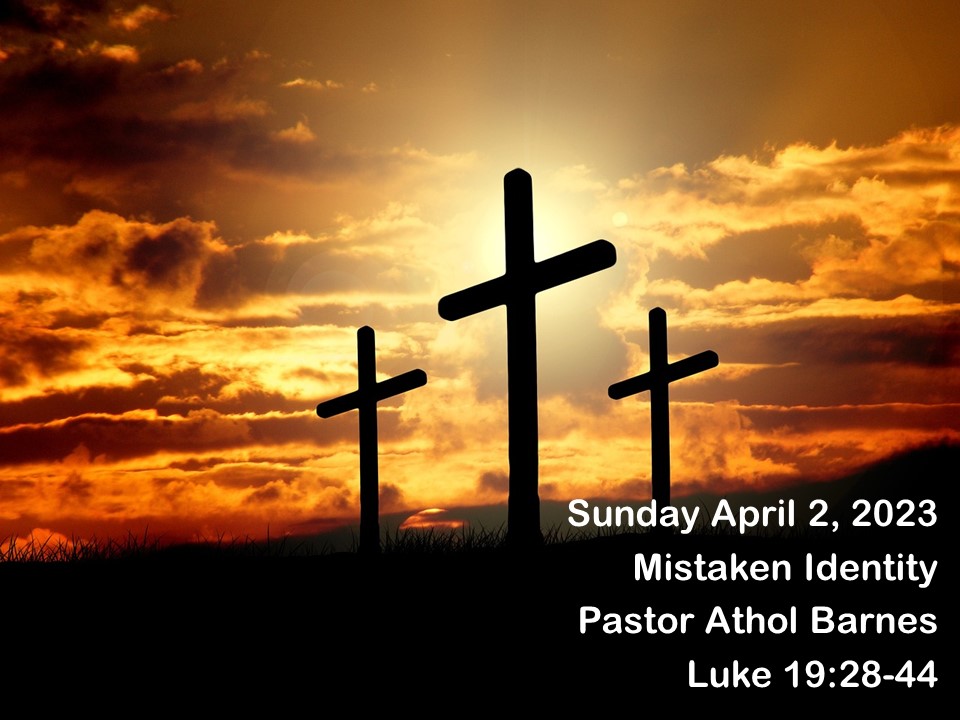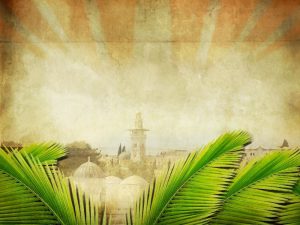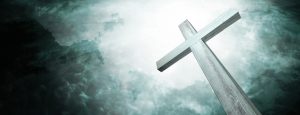
Palm Sunday is the day we remember Jesus entering Jerusalem riding on a donkey and being hailed as king. For the Jews it was a great day. Their King had come, and they expected that he was going to finally free them from the Roman empire.
But they were suffering from a case of mistaken identity, they didn’t realize who Jesus was. Who could blame them, we all have blind spots based on our education, culture and expectations.
It was a great day for the disciples of Jesus, they must have thought that it was the greatest day, this was their graduation day. How they missed it, and how the world missed it. It was a case of mistaken identity.
The most famous person in all of history never sought the limelight or the praise of men. But not this day, Jesus received the praises due to him, the people were singing and exalting him as lord.
Jesus rode towards Jerusalem on a colt that had never been ridden. The fact that the colt had never been ridden and yet submitted to Jesus demonstrates his sovereignty over his creation.
In times of war a conquering king would ride on a chariot or a stallion, but Jesus rode on a colt to declare that he is a king proclaiming peace.
This was Passover week and Jerusalem had other dignitaries arriving and staying there. Pontius Pilate, the Roman Governor, and Herod Antipas, the Tetrarch or King of the region of Galilee had arrived in town.
Jesus was surrounded by a crowd of people praising him (Luke 19:38). Probably in the crowd were Mary, Martha and Lazarus, and maybe even Zacchaeus. Many others whom Jesus had touched and whose lives were never the same.
Herod and Pilate did not take Jesus seriously, otherwise they would have sent a garrison of troops to prevent him from entering into the city.
The fact that the people were waving palm branches showed that they didn’t grasp who Jesus was, and why he was coming to Jerusalem. By waving palm branches they were showing that they expected Jesus to be another warlord, another general of the armies and one who would lead them to overthrow the Romans (see the Maccabean revolt in 160BC). They were saying that they were ready to pick up their swords & shields & go to war if He would lead them!
But then the mood shifts and something dramatic takes place. Jesus abruptly stops and begins to cry out loud. The Greek word used here indicates that Jesus burst into tears; this was not a silent control of emotion. It must have been awkward; I am sure Jesus’ disciples began trying to figure out how to save the day and get the celebration going again. Why was Jesus crying?
As Jesus looked at Jerusalem and he saw the eager faces of those around him, he was overcome by the awareness of their emptiness. They were empty because they had not heard the truth of his message; they did not understand the true purpose of his coming to earth. They had eyes, but they did not see, and ears but they did not hear. They were blinded by tradition and expectation. It was a case of Mistaken Identity
As Jesus looked around, he saw a lot of dead religious activity that was not accomplishing anything. The temple had become a den of thieves, and the city was full of people celebrating Passover with little understanding of its true meaning, or that it pointed to his own impending crucifixion.
Jesus looked at the City of David that was shortly about to come under attack and judgment. Jesus knew that in 40 years’ time the city would be under siege by the Romans for 143 days (Luke 19:43-44). The ancient historian Josephus estimated that between 600 thousand and 1.1 million Jews died in this Roman siege.
And all this because the people did not recognize the time of Jesus’ coming. It grieved Jesus because of his great love for the lost, the people he came to save (John 1:11).
Are we guilty of not seeing Jesus for who he really is? What does Jesus see as he looks at our hearts? Is he grieved because we are going about the motions of church?
Is he grieved because we are so weighed down by the weight of the problems of the world that we have no time for a relationship with him? Does He see people who are so busy doing things, so busy that they never bother to consider those things that are eternally important?
As Jesus looks at us, does he weep, because of the lost opportunities for a deeper relationship with him.
Jesus calls out to us today just the same way as he did over the city of Jerusalem, “If you, even you, had only known on this day what would bring you peace.” Luke 19:42.
If only you would see and acknowledge the true risen Lord, and stop living a life of performance and dead religion. If only you would stop trying to be good enough for God. You cannot be good enough. You don’t need to be perfect either. Jesus died so that you are forgiven, there is nothing you can do to earn the grace of God.
Do you just follow Jesus because of what you can get from him? Or do you truly have a relationship with the King of Kings, and it brings you peace that is beyond understanding.
Do you follow Jesus because it is your tradition? Do you follow Jesus because that is what you have always been taught to do?
Identify Jesus today.



